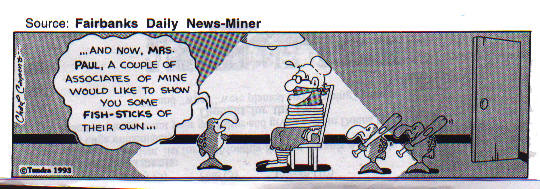 This collection of student work is from Frank Keim's classes. He wants to share these works for others to use as an example of culturally-based curriculum and documentation. These documents have been OCR-scanned and are available for educational use only.
This collection of student work is from Frank Keim's classes. He wants to share these works for others to use as an example of culturally-based curriculum and documentation. These documents have been OCR-scanned and are available for educational use only.Special | A | B | C | D | E | F | G | H | I | J | K | L | M | N | O
P | Q | R | S | T | U | V | W | X | Y | Z | ALL
Severe El Niño Prediction Dismays Alaska Fisherman:Severe El Niño Prediction Dismays Alaska Fisherman
El Niño is an oceanic and weather phenomenon that occurs in the tropical Pacific every 1-3 years. It was given its name which means the Christ child by Peruvians 200 years ago when they noticed ocean warming at Christmas time. El Niño will cause more severe weather over a large part of the world, leading to strange weather in different seasons. These changes also will affect the lives of many animals, such as the fish we have depended on here in Alaska for thousands of years. Fish are harmed because they depend on the cold, nutrient-rich water welling up from the depths, and warmer water keeps it from rising far enough. Some fish migrate to colder, richer waters. Others simply don't survive. In Monterey, California, El Niño has already caused a lot of severe weather problems. The natural phenomenon has battered the West Coast with storms, caused dry winters elsewhere and harmed marine life. Federal weather experts say that it is more severe than it was 15 years ago. Along with the severe increase in bad weather, the Pacific Ocean is warming at an alarming rate. As a result, fishermen are not catching as much fish as they did in recent years. The warmer weather changes the temperature in the water and drives these fish into cooler waters. For instance, El Niño caused the salmon to take another route off the shores of California, Oregon and Washington. This caused a bad fishing season in the western United States. Also, in Alaska, warmer surface water temperatures have prompted fisheries scientists to speculate that poor salmon runs in Bristol Bay and elsewhere were caused, at least partly, by El Niño. The warm water also may have drawn tuna and mackerel farther north. Just as the news indicated, tuna came as far up as Yakutat, Alaska, from the waters of California. That means the water temperature is increasing very quickly. In late July the water temperature was 59 degrees in Yakutat, and that is what tuna swim in. The other reason why we think the salmon population is slowly decreasing is because mackerel may have moved into waters off Vancouver and eaten millions of salmon smolts swimming into the Pacific Ocean. Several fish experts called for greater efforts to protect fish populations and habitats to preserve biological diversity and the source of vital industries. It's a big message the fish and El Niño are giving us. And we should be listening because we are facing world problems that we created on our own. This means that we're part of the reason there is El Niño and Global Warming. We should be more careful especially in our use of fossil fuels so we don't make this bad situation worse. Jackie Paul George
| |
|




